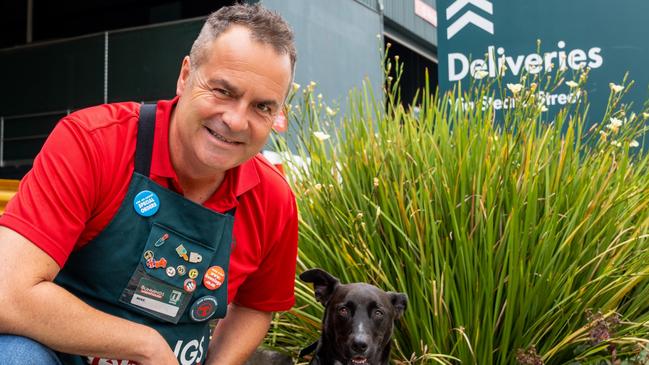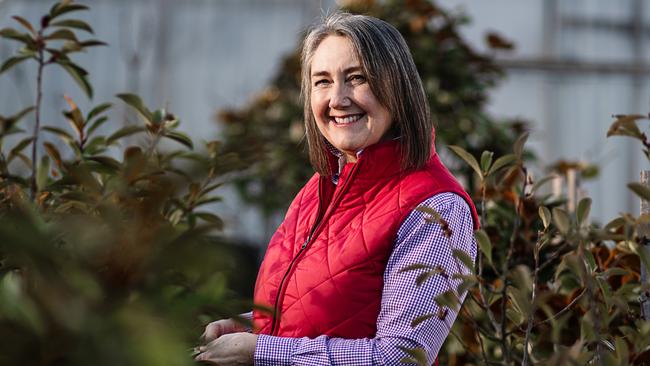Mental health concerns: Hear from the growers supplying Bunnings
The iconic warehouse is facing increased scrutiny as growers come forward with their stories of dealing with the hardware giant.
Bunnings Warehouse has hit back at claims growers supplying nursery plants were subjected to intimidation tactics or are at the mercy of contactless agreements.
It comes as a senate inquiry into supermarket prices continues, with the hardware giant appearing in Canberra later today.
Farmers growing seedlings, fruiting plants, and ornamental plants to Bunnings have reported mental health concerns, worries for the ongoing viability of their businesses, and even feeling suicidal after dealings with the warehouse.
Nick Powell is a nursery grower near Stanmore in Queensland in his 70s. Having faced health issues, including a battle with leukaemia, he has vented his frustrations at dealing with Bunnings Warehouse in the past.
He said after dealing with the uncertainty regarding a lack of supply orders and allocations for stock took a toll on his health.
“At that stage of the game, it was a mental issue for me, I just couldn’t cope anymore,” Mr Powell said.
Growing a mixture of indoor foliage plants and landscaping plants, Mr Powell said he felt he was a very good supplier to Bunnings, but grew increasingly frustrated with a lack of certainty around orders.
Mr Powell said Bunnings were their largest customer, with other minor customers.
“The issue was we’d try and get allocations for stock we knew would be ready at a certain time, that was the hard part,” Mr Powell said.
He said there were no supply contracts at all between his nursery and Bunnings.
“You might get a maybe, you might get a yes.”
In order to work with the uncertainty, Mr Powell would invest in bigger pots to replant stock in “to keep growing it, and hope to sell it as larger stock items”.
“That was one of the only ways we could cope with not being able to get our stock into store.”
Mr Powell pushed back at claims from the hardware giant that their market share is slim.
“If you believe that, you believe in fairies at the bottom of the garden. That’s just bullshit.”
Bunnings managing director Mike Schneider said claims the company does not have contracts “or that our team refuse to make commitments or agree to price increases are simply not true”.
In his submission to the senate inquiry, Mr Schneider said claims made by GIA “are not supported by widely available industry data and mischaracterise the greenlife sector”.
A Roy Morgan survey found Bunnings was Australia’s most trusted brand in the 12 months to December 2023, beating Woolworths.
Last month, the company announced earnings in the six months ending December 2023 lifted more than 3 per cent, with operating revenue lifting 1.7 per cent to $9.963 million.
Mr Schneider said about 40 per cent of Bunnings’ total sales went to the building, farming, government, and commercial sector, with the remaining 60 per cent direct to consumer.
He said Bunnings would be willing to meet with GIA representatives and growers to air their concerns.
“It distresses me deeply that people supplying us feel let down,” Mr Schneider said.
“But if I don’t know about it, I can’t help.
“We are deeply concerned by the comments from a former supplier of ours about challenges they have experienced in dealings with us. We’ve always maintained that we don’t always get it right, and if we’ve done something wrong, even if that was in the past, we will work incredibly hard to put it right.”
Karen Brock is a nursery grower based in Tasmania, whose business Brocklands Nursery supplied native trees, grafted and standard roses, herbs and perennial plants to Bunnings from 2003 to 2016.
She said the relationship worked “incredibly well”, until increased demand to supply plants for merchandise stands in store “with no contract or even an indication of what numbers they were looking at” placed her business under pressure.

“When you’ve got merchandise space, you’ve got this Holy Grail of space, it gives you confidence to put stock on the ground, but not off an order,” Ms Brock said.
“We were growing (plants) two years out, this is a long-term investment you’re spending now to get a sale out of in two years. You get the confidence, and you get sucked in, you start investing and borrowing money because you have to put all this stock down.”
She said there was no supply contact, and was subjected to intimidation when complaints were raised with Bunnings, citing one example where an entire range of plants were cancelled.
“They would not give decent orders, they would not confirm orders, they would not give us any forward planning,” Ms Brock said.
When Ms Brock raised concerns with Bunnings, she said the barcode for her product was cancelled.

Grower body Greenlife Industry Australia, in its submission to the upcoming senate inquiry into the food and grocery code of practice, said 67 per cent of Greenlife growers feel Bunnings trade terms are “not good enough”, calling on the warehouse to be included in the code.
As diverse as the agriculture is, so too is the views of the farmers across industry.
A GIA spokesperson said while the organisation did not have an exact figure, it is understood the vast majority of GIA’s medium and large business members supply Bunnings.
A Bunnings spokesperson confirmed every supplier of plants to Bunnings was a Greenlife supplier.
Tim Drewitt is a nursery plant grower, selling dormant bulb lines to Bunnings through his Silvan-based farm, Dewitt’s Bulbs.
He said he has supplied product to Bunnings since late 2018, and has had a positive relationship with the company, contrary to some stories being told by other suppliers.
“We’re purely a Mum and Dad business, I have a young family,” Mr Drewitt said.
“I’m a little frustrated with GIA. I have reached out to them a couple of times asking for support in various avenues, and they tend not to respond.
“I’m sure there are suppliers who have had issues, but I have not experienced that. We employ up to 30 employees, and especially during Covid, the support and patience shown by Bunnings was very accommodating.”
Greenlife Industry Australia chief executive Joanna Cave said fear of retribution or being punished for raising complaints against Bunnings was “the biggest issue” growers expressed to her.
“It’s been the No. 1 preoccupation for growers,” Ms Cave said.
“It’s taken us a very long time to find growers willing to go on the record and share their stories. They’ve all exited their relationship with Bunnings and it’s given them confidence. The fear of retribution is huge.”
Ms Cave said many growers have considered walking away from the industry, with many having sold their businesses to land developers.
“What’s shocked and saddened us is the huge incidence of mental health issues,” Ms Cave said.
“One statement submitted by a grower said they had contemplated suicide. We’re shocked by how prevalent this is.”
An Agriculture Victoria report published in January 2023 quantified the gross value of nurseries and floriculture in the state at $696 million, with about 490 nursery and floriculture farm businesses in 2020-21.
National Farmers Federation Horticulture Council chair Jolyon Burnett said while nursery growers were a small part of agriculture, they played a large role in horticulture, with the sector valued at about $2 billion at a retail level.
“The issues facing commercial growers, and they are primary producers who are part of the NFF and considered primary producers by the government, they are producing plants rather than food,” Mr Burnett said.
“But they are faced with the same issues of this incredible power imbalance.”
Mr Schneider said Bunnings represented about 25 per cent of the overall plant market in Australia, with the company’s building and hardware accounting for 18 per cent of the country’s market share.
An independent whistleblower resource managed through Deloitte was also available to suppliers, Mr Schneider said.
“We have previously asked the GIA for their assistance in connecting growers with us if there are concerns so we can assist and support them,” Mr Schneider said.
“We have reached out to all current Greenlife suppliers and encourage anyone that has feedback or an issue they’d like to discuss to contact us directly so we can investigate.”





